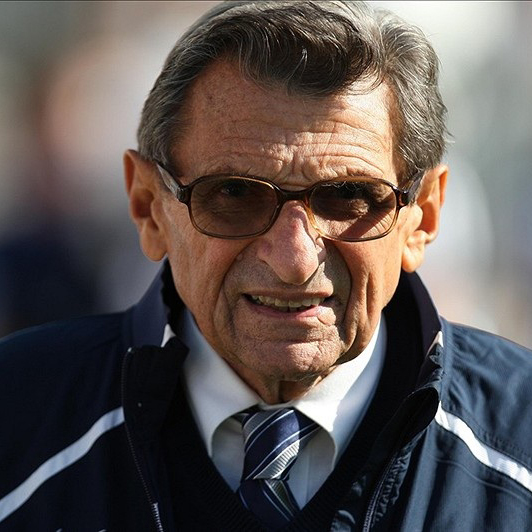Tom Dienhart, BTN.com Senior Writer, January 22, 2012
Penn State, college football and the nation have lost an icon with the passing of Joe Paterno, who succumbed to a short battle with lung cancer. For almost the last 50 years, Paterno, 85, became the face of Penn State, if not the college football world. Prowling the sideline of Beaver Stadium in his pant legs rolled up exposing his white socks and sporting his famously thick, black glasses, Paterno would become the all-time winningest coach in major college history.
But Paterno meant so much more to the Penn State family. He wasn?t Coach, he was Paterno, he wasn?t Joe ? he was ?JoePa,? a beloved father figure from a black-and-white era who seemingly stood for all the right things even as the world and its values changed.
But despite all of the victories, all of the millions of dollars he and his wife donated to various university causes, Paterno?s legacy forever will be stained by the sex abuse scandal that cost him his job-and good name.
While Paterno faced no legal ramifications from the child sex-abuse accusations against former Penn State defensive coordinator Jerry Sandusky that shook the nation, many feel he fell short in his moral obligation to do more to stop the alleged abuse he was made aware of it in 2002 by an assistant.
Paterno said he told his boss-A.D. Tim Curley–about the abuse assistant coach Mike McQueary told him that he had witnessed between Sandusky and a youth, which was all Paterno legally was obligated to do. Paterno later said in November that ?with the benefit of hindsight, I wish I had done more.?
News of the child sex-abuse case broke soon after Paterno beat Illinois on October 29 to become the all-time winningest FBS coach with 409 victories. He subsequently was fired on November 8.
Earlier this month, Paterno spoke publicly for the first and only time since the scandal broke. In an interview with the Washington Post, Paterno said he was hesitant to make follow up calls about what he was told by McQueary because he didn?t want to be seen as trying to exert influence for or against Sandusky.
"I didn't know which way to go … And rather than get in there and make a mistake," Paterno told the Post, trailing off.
After arriving in State College, Pa., in 1950 as an assistant to Rip Engle, Paterno assumed command of the program in 1966. Over the next 46 years, he built Penn State into a national power. And in the process, he brought the university along with him, instilling an unshakeable pride in alums that?s embodied in the rousing ?We are! Penn State!? chant that is the school?s prideful rallying cry.
Paterno?s on-field accomplishments are legendary. He coached five undefeated and untied teams, earning national championships in 1982 and 1986.Many think Paterno should have won more national crowns, as four of his perfect teams (1968, 1969, 1973, 1994) capped seasons by winning major bowls but weren?t accorded national championship status.
Paterno also had a big impact on the Big Ten, leading Penn State to three conference titles (1994, 2005, 2008) and a Rose Bowl championship after the ?94 season with a win over Oregon. Paterno is fifth all-time in Big Ten victories with 95.
The Sandusky investigation marches on at Penn State and is far from complete. But Paterno won?t be around to see how this sordid affair will be punctuated. Regardless, his legacy is cemented ? all of the good along with the bad, sad and tragic end that no one could have envisioned being the way Paterno would leave the sport.
Find all of BTN.com senior writer Tom Dienhart?s work at www.btn.com/tomdienhart, follow him on Twitter at @BTNTomDienhart, send a question to his weekly mailbag here, and subscribe to his RSS feed.







